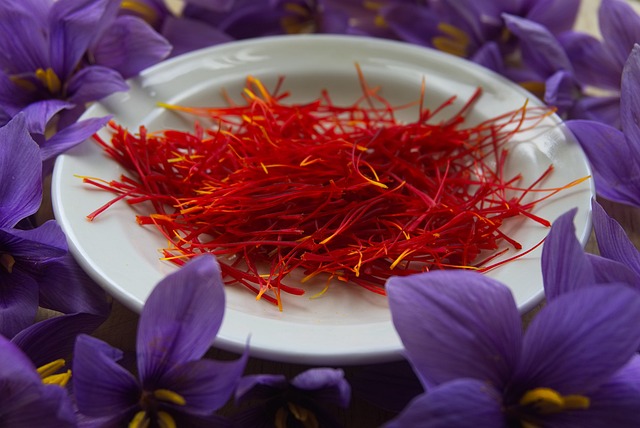What are the Benefits of Saffron?
What are the Benefits of Saffron?

What are the Benefits of Saffron?
Saffron is a golden spice derived from the Crocus sativus flower. It boasts a rich history spanning millennia and offers numerous health benefits. From ancient civilizations to modern wellness, saffron has held a revered place for its vibrant color, unique flavor, and therapeutic properties. Hence making it one of the most expensive spices This article will explore the benefits of saffron, and its historical significance, and equip you with essential tips to identify high-quality saffron.
Historical Significance of Saffron
Saffron's journey traces back over 3,500 years, originating in the Mediterranean region and permeating various cultures worldwide. Ancient civilizations such as the Greeks, Romans, and Egyptians valued saffron for its culinary, medicinal, and ceremonial roles.
The Greeks revered saffron for its versatility, using it as a seasoning, dye, perfume, and medicine. Likewise, the Romans incorporated saffron into their lavish feasts, believing in its healing properties and association with luxury. Across ancient cultures, saffron adorned tables during celebrations, rituals, and religious ceremonies, symbolizing prosperity and well-being.
7 Golden Benefits of Saffron
Potent Antioxidant Properties
Saffron is a powerhouse of antioxidants, including crocin, crocetin, safranal, and kaempferol. These compounds combat oxidative stress, neutralize free radicals, and protect cells from damage. Regular consumption of saffron may reduce the risk of chronic diseases such as cancer and heart disease.
Mood Enhancement and Mental Well-being
Studies suggest that saffron exhibits antidepressant and anxiolytic effects, attributed to its ability to modulate neurotransmitters like serotonin and dopamine. Incorporating saffron into your diet may help alleviate symptoms of depression, anxiety, and mood disorders, promoting emotional balance and mental wellness.
Anti-Inflammatory and Pain-Relief
The bioactive compounds in saffron possess potent anti-inflammatory properties, making it beneficial for managing inflammatory conditions like arthritis, rheumatism, and inflammatory bowel diseases. Saffron's natural analgesic properties may also help alleviate pain and discomfort associated with these conditions.
Enhanced Cognitive Function and Neuroprotection
Research indicates that saffron may improve cognitive function, memory retention, and learning abilities. It is being studied for its potential in managing neurodegenerative disorders such as Alzheimer's disease and age-related mental decline. Saffron's neuroprotective properties offer promising avenues for brain health and longevity.
Cardiovascular Support
Saffron promotes heart health by lowering cholesterol levels, improving blood circulation, and reducing the risk of cardiovascular diseases. Its vasodilatory effects help maintain healthy blood pressure, while its antioxidant properties protect against oxidative damage to cardiac tissues.
Digestive Wellness and Appetite Regulation
Traditionally used to aid digestion and alleviate gastrointestinal discomfort, saffron supports digestive wellness by stimulating enzyme secretion, reducing inflammation, and promoting gut motility. Additionally, saffron's natural appetite-suppressant properties may aid in weight management and portion control.
Vision Protection and Eye Health
Saffron contains carotenoids like crocin, which are beneficial for eye health. Regular consumption of saffron may protect against age-related macular degeneration, improve visual acuity, and maintain overall eye health.
Tips to Identify Genuine Saffron
As the demand for saffron continues to rise, so does the prevalence of adulteration or low-grade in the market. Here are essential tips to help you identify authentic saffron:
- Vibrant Color and Aroma: Genuine saffron strands exhibit a deep red color with a slight orange hue and emit a distinctive aroma. Avoid saffron with a dull appearance or weak scent, as it may indicate adulteration.
- Thread-like Stigmas: Authentic saffron consists of delicate, thread-like stigmas that are easily recognizable. Beware of saffron with a powdery or granular texture, as it may be mixed with other substances.
- Water Test: When soaked in water, real saffron releases a rich, reddish color, while counterfeit saffron may leave behind a pale or artificial dye. Conducting a simple water test can help verify saffron's authenticity.
- Price and Source: Producing high-quality saffron is labor-intensive, resulting in a higher price tag. Be cautious of significantly discounted saffron, as it may be of inferior quality or adulterated. Purchase saffron from reputable sources or trusted brands known for their authenticity and transparency.
- Certifications and Quality Standards: Look for certifications such as ISO (International Organization for Standardization), FSSAI (Food Safety and Standards Authority of India), or PGI (Protected Geographical Indication) that guarantee saffron quality, purity, and origin. Certifications from recognized authorities ensure that you're purchasing genuine saffron with confidence.
Conclusion
From ancient civilizations to modern-day applications, Saffron's legacy underscores its remarkable benefits and timeless appeal. Whether used in culinary delights, therapeutic remedies, or wellness practices, saffron continues to captivate and inspire with its golden hue and holistic advantages.
